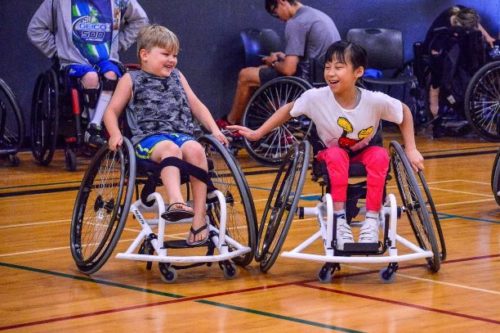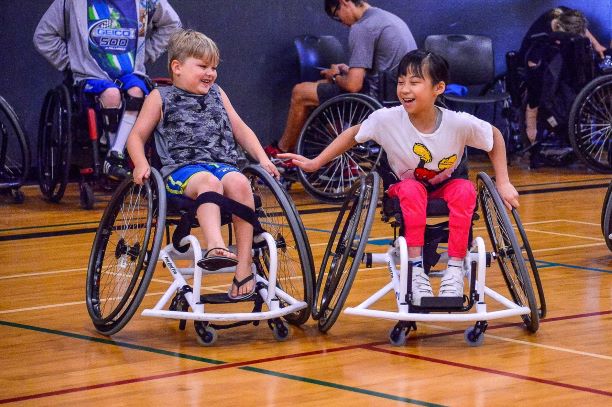Let’s Play BC ignites passion
 The creators of Let’s Play BC have a pretty straightforward ambition.
The creators of Let’s Play BC have a pretty straightforward ambition.
“Basically the vision for Let’s Play is to give every child with a mobility-related physical disability a healthy, happy start to being active. So we provide equipment and resources in order to do that,” said Marni Abbott-Peter, during the 2021 Virtual Sport for Life Canadian Summit.
“We have fun and work on our fundamental movement skills.”
Let’s Play is a program of the BC Wheelchair Basketball Society, and is focused on the first two stages of Long-Term Development in Sport and Physical Activity: Active Start and FUNdamentals. They provide everything the kids need to learn wheeling and become active in their home, school and communities.
“We want to create awareness, engage the person or the family, educate the teachers and the people working with the child, then get them connected with the programming that will allow them to be participating and active on a regular basis.”
Currently Let’s Play has 223 sport chairs in their inventory that they loan to the children, and 10 chair champions across the province. A chair champion is a community, school district, or organization that has a fleet of the Let’s Play sport wheelchairs and uses them as they see fit. To date they have chair champions in Prince George, Victoria, Langley/Fraser Valley, Kamloops, Chilliwack, and Cranbrook. The teachers of each class usually participate with their students, but teachers are mentored in adaptive physical literacy, teaching the skill of wheeling and tips on including everyone in their classroom in physical activity.
“When we can, we invite athlete ambassadors to come and do the school visits with our school’s program coordinator. Those are Canada Games athletes, B.C. Games athletes, or past athletes from our program, and it’s to show that everyone is welcome to play,” said Nadine Barbisan, noting that there are multiple sports the kids can engage in.
“We have partners in wheelchair racing, we have hand cycling … we have wheelchair tennis, we’ve referred kids to adapted sailing, wheelchair curling, sledge hockey, sit-skiing and many more. [Abbott-Peter] and I aren’t experts at everything but we want to partner our families with other organizations so they can empower themselves and their families to be active.”
The program has expanded in unexpected ways, with parents requesting chairs for birthday parties and other special events. When the pandemic struck in April, both Abbott-Peter and Barbisan collaborated on creating virtual events to keep kids connected.
“We had dancing, fitness, colouring — we would share our screen and just get moving and increase our heart rate. We found this was a great way to connect kids from all over the province on a screen,” said Barbisan.
“We had kids from Prince George, the Okanagan, Victoria, all on one screen.”
One inspirational aspect of the virtual get-togethers was that Let’s Play brought in Paralympians and other successful athletes who shared their experiences. Many of the students did not have any physical activity opportunities from March to June, so the chance to be active while connecting with others was a crucial lifeline for them.
Canadian Tire Jumpstart has provided the program with significant funding, which goes towards purchasing chairs and training teachers. Let’s Play recently teamed up with PISE to go into schools and apply adaptive programming and promote inclusivity.
“During normal times, PISE offers programs within their facility using the sport wheelchairs. They also contract program staff to do school visits and mentor teachers. So their regular programs offered by the facility or local wheelchair sports clubs directly target kids with physical disabilities. The school visits are another avenue to mentor teachers, promote inclusion and offer students a fun, new way to play. Those are booked through each school district and all students no matter what their abilities are can participate,” said Abbott-Peter.
She’s looking forward to continuing to collaborate post-pandemic.
“We were able to work through different goals we had for the different Let’s Play athletes. I connected with the families before all these programs starting in October and I was able to come up with some goals for what they wanted to get out of the session,” she said.
“Some common themes were increased confidence, physical literacy skills, and fundamental movement skills.”

